高三英语复合句
图片预览
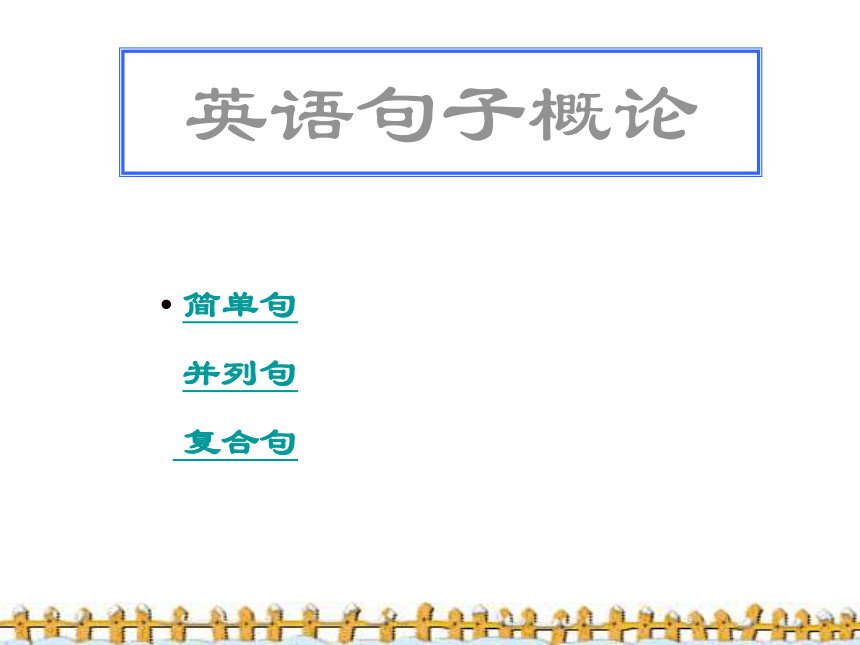
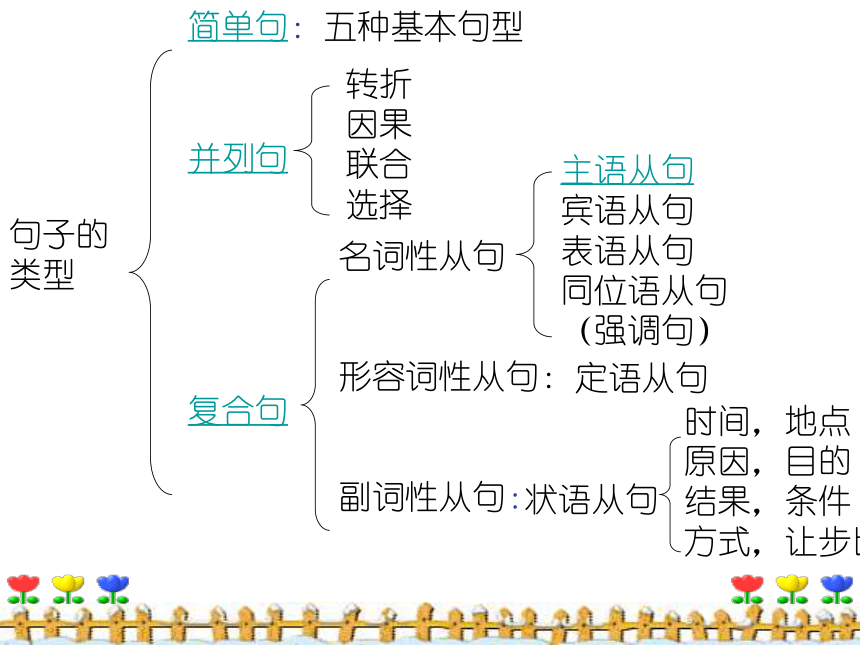
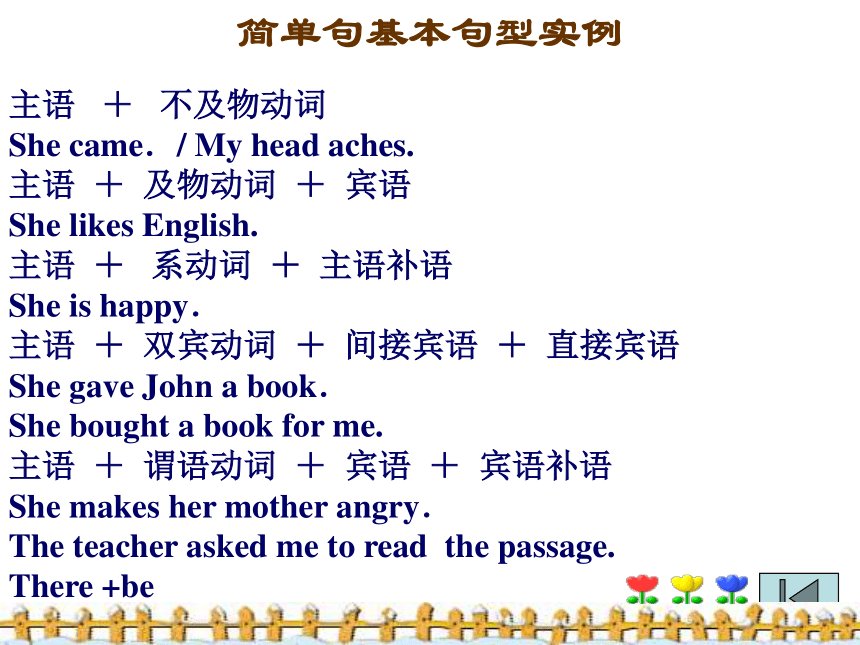
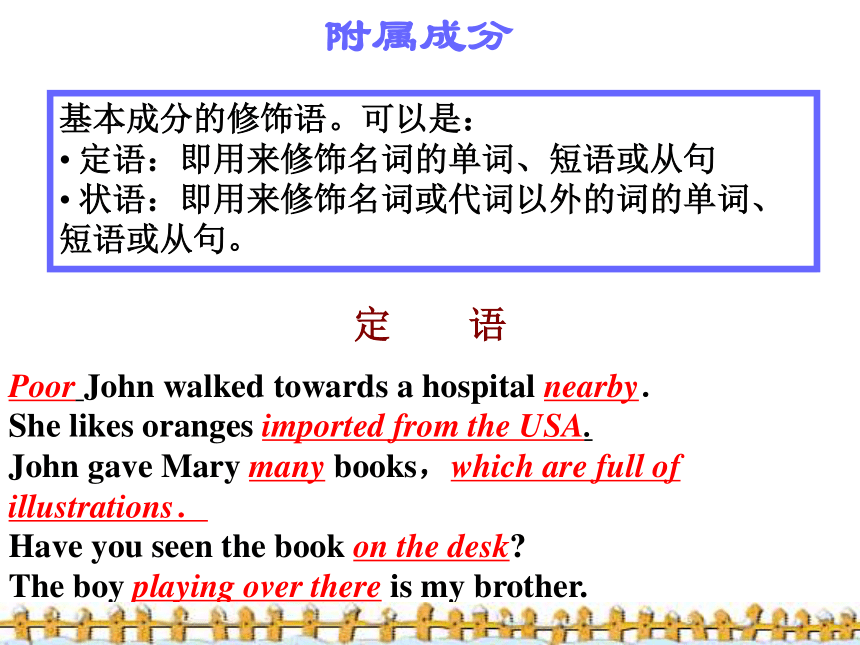
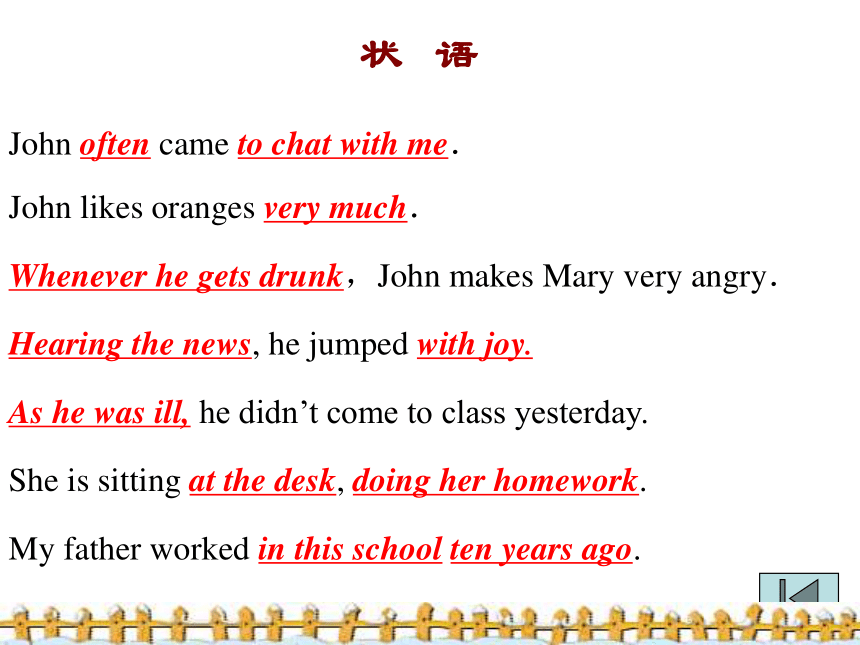
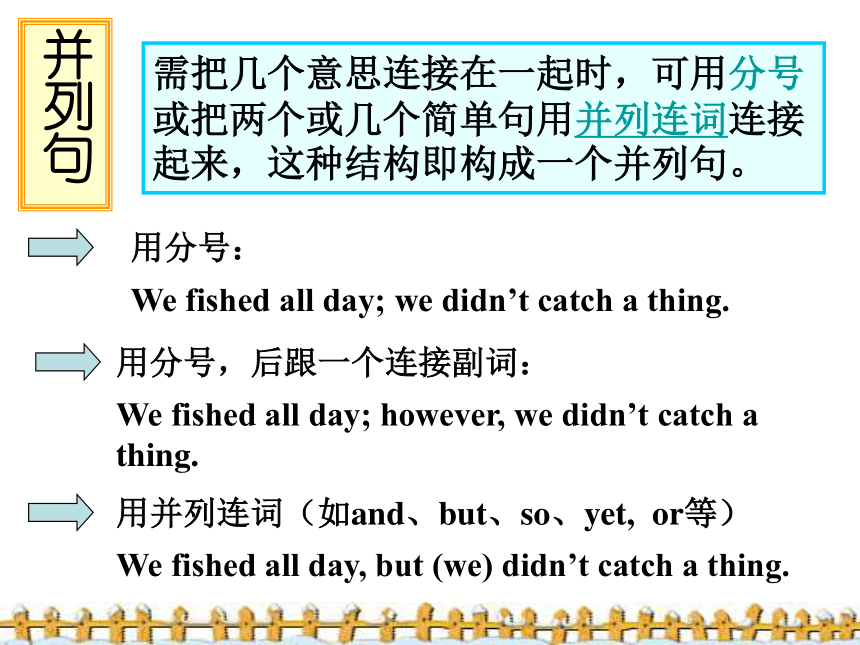
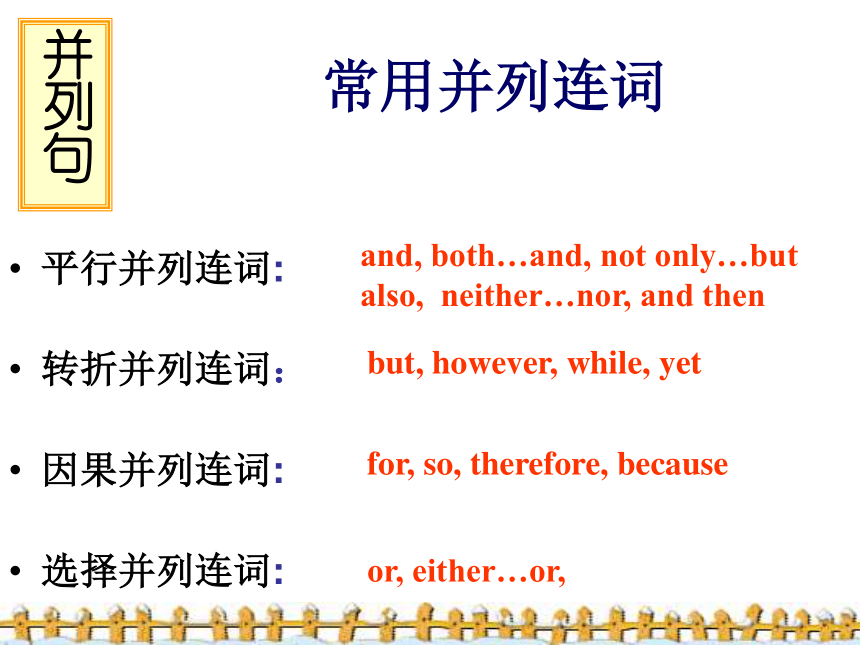
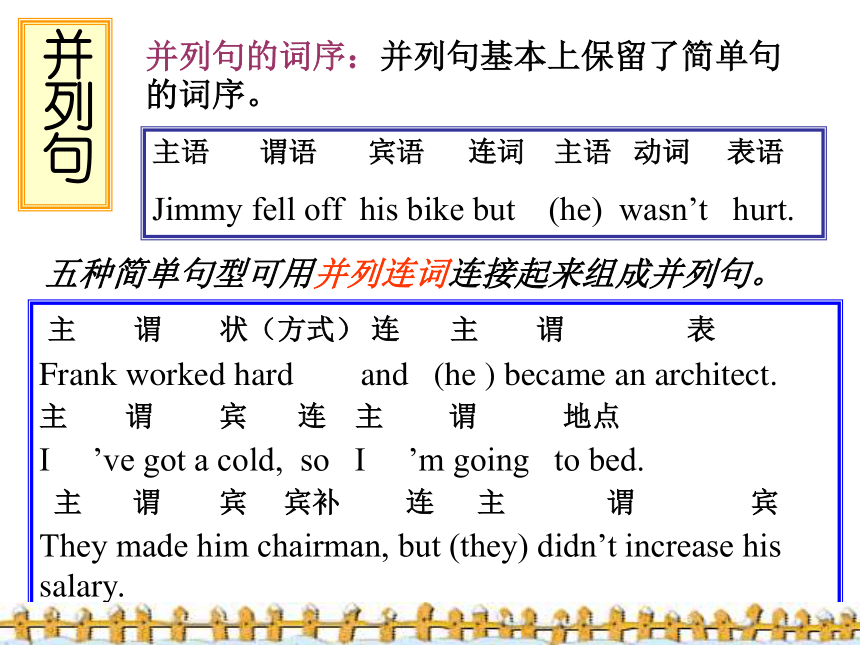
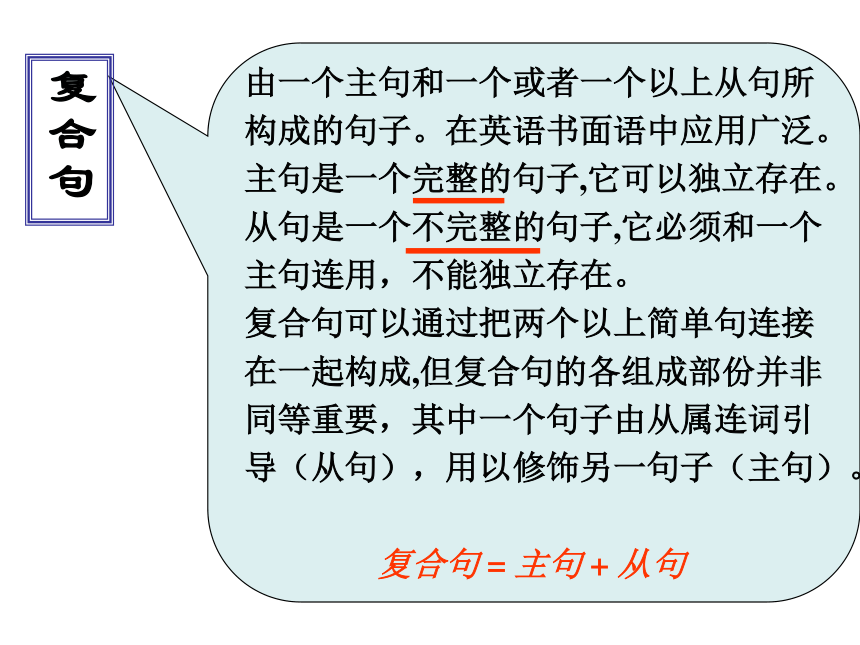
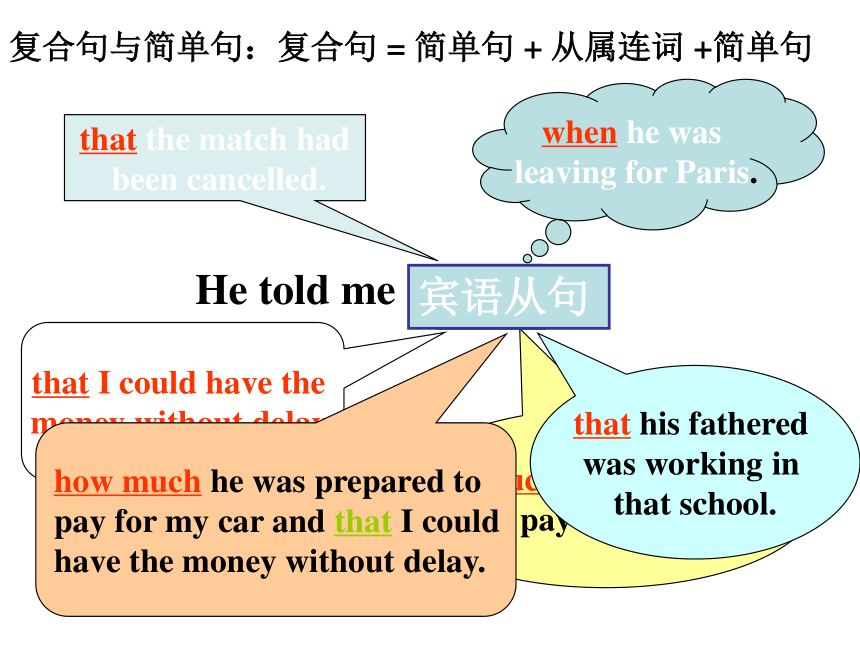
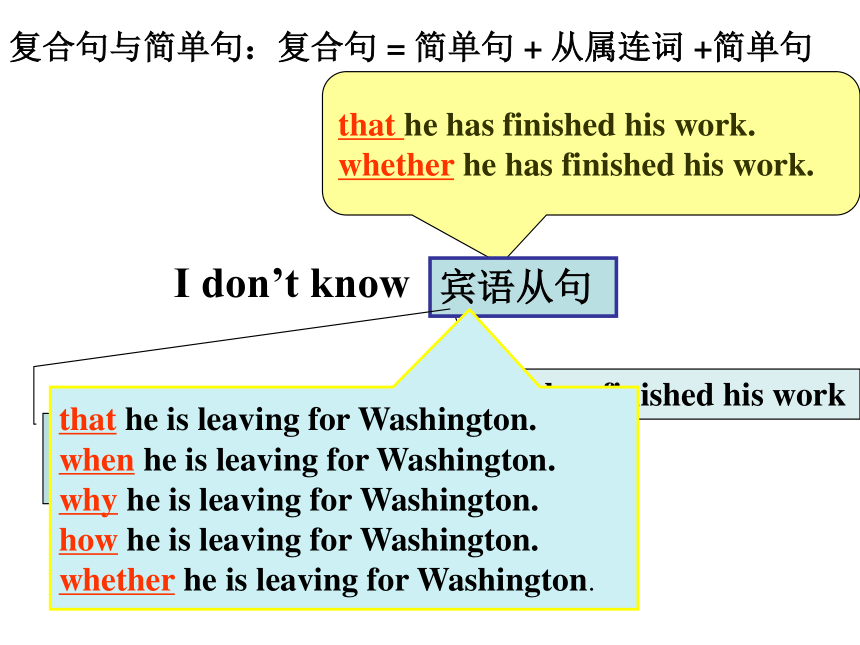
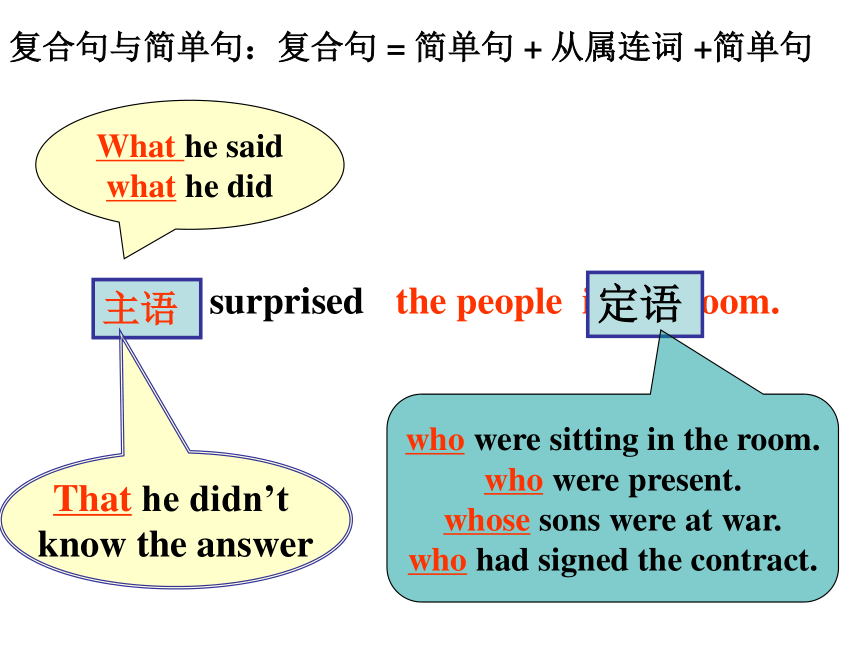
文档简介
课件74张PPT。英语句子概论 简单句
并列句
复合句句子的
类型简单句:
并列句
复合句转折
因果
联合
选择
名词性从句
形容词性从句:
副词性从句:主语从句
宾语从句
表语从句
同位语从句
(强调句)
定语从句状语从句时间,地点
原因,目的
结果,条件
方式,让步比较五种基本句型主语 + 不及物动词
She came./ My head aches.
主语 + 及物动词 + 宾语
She likes English.
主语 + 系动词 + 主语补语
She is happy.
主语 + 双宾动词 + 间接宾语 + 直接宾语
She gave John a book.
She bought a book for me.
主语 + 谓语动词 + 宾语 + 宾语补语
She makes her mother angry.
The teacher asked me to read the passage.
There +be
There lies a book on the desk.简单句基本句型实例附属成分基本成分的修饰语。可以是:
定语:即用来修饰名词的单词、短语或从句
状语:即用来修饰名词或代词以外的词的单词、短语或从句。定 语
Poor John walked towards a hospital nearby.
She likes oranges imported from the USA.
John gave Mary many books,which are full of illustrations.
Have you seen the book on the desk?
The boy playing over there is my brother.
People there like sports.John often came to chat with me.
John likes oranges very much.
Whenever he gets drunk,John makes Mary very angry.
Hearing the news, he jumped with joy.
As he was ill, he didn’t come to class yesterday.
She is sitting at the desk, doing her homework.
My father worked in this school ten years ago.
You’d better stay here.状 语并列句需把几个意思连接在一起时,可用分号或把两个或几个简单句用并列连词连接起来,这种结构即构成一个并列句。用分号:
We fished all day; we didn’t catch a thing.用分号,后跟一个连接副词:
We fished all day; however, we didn’t catch a thing.用并列连词(如and、but、so、yet, or等)
We fished all day, but (we) didn’t catch a thing.并列句常用并列连词
平行并列连词:
转折并列连词:
因果并列连词:
选择并列连词:and, both…and, not only…but also, neither…nor, and thenbut, however, while, yetfor, so, therefore, becauseor, either…or, 并列句并列句的词序:并列句基本上保留了简单句的词序。主语 谓语 宾语 连词 主语 动词 表语
Jimmy fell off his bike but (he) wasn’t hurt.五种简单句型可用并列连词连接起来组成并列句。 主 谓 状(方式) 连 主 谓 表
Frank worked hard and (he ) became an architect.
主 谓 宾 连 主 谓 地点
I ’ve got a cold, so I ’m going to bed.
主 谓 宾 宾补 连 主 谓 宾
They made him chairman, but (they) didn’t increase his salary.由一个主句和一个或者一个以上从句所
构成的句子。在英语书面语中应用广泛。
主句是一个完整的句子,它可以独立存在。
从句是一个不完整的句子,它必须和一个
主句连用,不能独立存在。
复合句可以通过把两个以上简单句连接
在一起构成,但复合句的各组成部份并非
同等重要,其中一个句子由从属连词引
导(从句),用以修饰另一句子(主句)。
复合句 = 主句 + 从句复合句复合句与简单句:复合句 = 简单句 + 从属连词 +简单句He told me the news.that the match had
been cancelled.宾语how much he was prepared
to pay for my car.that I could have the
money without delay.how much he was prepared to
pay for my car and that I could
have the money without delay. when he was
leaving for Paris.that his fathered
was working in
that school.宾语从句复合句与简单句:复合句 = 简单句 + 从属连词 +简单句I don’t knowhim.He has finished his work that he has finished his work.
whether he has finished his work.宾语从句He is leaving for Washington.that he is leaving for Washington.
when he is leaving for Washington.
why he is leaving for Washington.
how he is leaving for Washington.
whether he is leaving for Washington.复合句与简单句:复合句 = 简单句 + 从属连词 +简单句the people surprised That What he said
what he did主语That he didn’t
know the answerin the room.定语who were sitting in the room.
who were present.
whose sons were at war.
who had signed the contract.复合句与简单句:复合句 = 简单句 + 从属连词 +简单句That is the fact.表 语what he needs.
what he gave me.
why he was late.
because he was ill.
what has happened.复合句与简单句:复合句 = 简单句 + 从属连词 +简单句He worked in that factorythree years ago.地点状语时间状语where his
father workedin that factorywhere I livedwhen he
lived thereHis father worked there.I lived there.He lived there
three years ago.复合句与简单句:复合句 = 简单句 + 从属连词 +简单句Put the book on the desk.where you took it.where it was.地点状语where you found it.You can’t camp here.where there are
a lot of trees.wherever you like.I don’t know the news.进一步解释that he won the match. 同位语从句The Attributive Clause(定语从句)Which baby is Jack?穿红裤子的baby是Jack。The baby is Jack.The baby is Jack.whose trousers are redwho is wearing red trousersJackThe baby ___________________is Jack.(非谓语
动词)wearing red trousersWhich house is mine?房顶是棕色的房子是我的。The house is mine.whose roof is brownThe house is mine.of which the roof is brownMy houseThe Attributive Clause定语从句.在复句中修饰名词或代词的从句叫做定语从句。
定语从句所修饰的词叫先行词。
The woman who lives next door is a teacher.
先行词定语从句关系代词关系代词:代替是名词或代词的先行词,在从句中当主语或宾语,
定语的 代词。
{Which woman is a teacher?
The woman who lives next door is a teacher.1 The woman is a teacher.
2 The woman lives next door.The road was destroyed in the earthquake.
It has now been built stronger.ItThe people were in danger.
The soldiers have saved them.themThe waiter was very friendly and polite .
He served us tea.HeA dictionary is a book.
You can use it to learn more words.itThe Attributive Clause (定语从句)在复句中修饰名词或代词的从句叫做定语从句。
定语从句所修饰的词叫先行词。
学习定语从句的关键是如何选择关联词。
由于关系代词在主句与从句间既起到联系作用,又在从句中充当一个成分,因此, 要正确判断关系代词在从句中的功能,如作主语还是宾语等。
做宾语时,可以省略。当先行词指人时,关系代词可用 who(做主语,宾语),that(做主语,宾语),
whom(作宾语),whose(作定语)当先行词指物时,关系代词可用 which(做主语,宾语),that(做主语,宾语),
whose(作定语)做宾语时,可以省略关系代词: 1. who指人,作主语或宾语 (作宾语可省略)The man who I talked with is our teacher.A person who steals things is called a thief.2. whom指人,作宾语 (作宾语可省略,
如介词提前则不能省) The man (whom/who) I nodded to is Mr. Li.The man to whom I nodded is Professor Li.3. which 指物,作主语或宾语 (作宾语可省
略, 如介词提前则不能省) These are the trees which/that were planted
last year.This recorder (which/that) he is using is
made in Japan. Is this the library (which/that) you borrow books from?Is this the library from which you borrow
books? 4. that 指人/物,作主语或宾语 (作宾语可省略)A plane is a machine. It can fly.A plane is a machine that can fly.He is the man. I told you about him.He is the man (that/who/whom) I told you about.He is the man about whom I told you aboutThe man to whom I nodded is Professor Li.如果介词提前,作宾语的关系代词不能省略指物,只用 which
指人,只用whom
Is this the library from which you borrow books?Is this the library (which) you borrow books from?
The man (whom/who) I nodded to is Mr. Li.
(1) The scientist is very famous in the world. We met her yesterday.The scientist ? we met yesterday is very famous
who in the world.
whom
that(2) The dress is new. She is wearing it.The dress that she is wearing is new.
which
? (3) He is the kind person.
I have ever worked with him. (4) This is the best film. I have ever seen this film.He is the kind person that I have ever worked with.
who
whom
?This is the best film that I have ever seen.
?Fill in the blanks with who, whom, that, or which.1 The earthquake ____________ hit the city in 1906 was the biggest in American history.
2 We don’t know the number of people __________ lost their homes in the 1906 earthquake.
3 The house ____________ they built in 1987 stayed up in the earthquake.
4 A house ___________ is built on sand may fall down in an earthquake.
5Luckily none of the people ___________ I know were killed in the earthquake.
6 people _________ study earthquakes thinks that there will be another big one soon.
which/thatwho/thatwhich/thatwhich/thatwho/whomwhoWhose(…人/物的) 在定语从句中作定语,表示引导词
与 whose 后的名词为所属关系。 whose
指人,也可指物,指物时可与 of which
互换使用。Whose is used instead for his/her/their/its.This is the book ________cover is blue.
This is the book __________the cover is blue.
This is the book the cover of which is blue.whoseof whichThe girl whose mother is a doctor is my classmate. The girl the mother of whom is a doctor
is my classmate.
The girl of whom the mother is a doctor is my classmate.whose 引导的定语从句。表示所属关系。The river _________ banks are covered with trees flows to the sea.whoseThere are in this class 20 students, ______ are different.
A.whose backgrounds
B.the backgrounds of whom
C.of whom the backgrounds
D.the backgrounds of whose限制性定语从句和非限制性定语从句:My sister, who is twenty, works in
a bank.The man who came here yesterday has
come again.限制性定语从句是先行词在意义上不可缺少的定语,
如果去掉,主句的意思就不完整或失去意义。这种从
句和主句关系十分密切, 写时不用逗号分开。非限制性定语从句和主句关系不很密切,只是对先
行词作些附加说明, 如果去掉,主句的意思仍然清楚。
这种从句, 写时往往逗号分开。在非限制性定语从句中,(逗号前)指人时,只用who,指物时,只用which。She looked at Jeff, _____was waving his arms.
Football, ______is a very interesting game, is loved by most people in the world. whowhichFill in the blanks with who, whom, whose that, or which.1 I have a friend ______ likes listening to classical music.
2 Yesterday Emily was wearing the new dress __________ I gave her.
3 The man ______ leg broke in a match used to be a football player.
4 Kevin is reading a book __________ is too difficult for him.
whowhich/thatwhoseWhich/thatFill in the blanks with who, whom, whose that, or which.5 The family _____ I’m staying with lives in town.
6 I know the student ________ article was published.
7 Betty, ______ has never been abroad, is studying English very well.
8 My parents live in a house ____________ is more than 100 years old.
9 The boy with _______ John spoke is my brother.thatwhosewhowhich/thatwhom1.The earth is round, _________ is known to all.2. ____ is known to all, the earth is roundas 具有“正如”之意,搭配的动词一般是固定的,如:
as you know/ as you see/as we planned/
as we expected/as is reported/as is announcd.
位置灵活,可放在主句前,中,后.Which/asAsWhich 引导时,只放在主句后,多用于动词的结构为be +adj或v+n+补语以及否定句中.意为这,这一点.如, He came to school late this morning ,which made his teacher very angry.
They won the football match,which was
not expected.
Mr.Zhang is innocent of the murder, which is clear now.
They are friends , which is obvious.As在定语从句中还常与such, the same连用
既such……as 和the same……as(与…一样,但
并非就是那个)注意the same…as 与the same ……that的区别the same ……that(就是那个)
如.1. I borrowed the same book ___ you returned to
the library yester.
(我借了你昨天还给图书馆的那本书)
2. I borrowed the same book ___ you bought yesterday.
(我借了一本跟你昨天买的那本一样的书)
thatas关系副词:when=on/in/at which
where=on/in which
why=for which
在从句中当状语1. This is the town _____ I was born.
This is the town _____ I visited last week.
2. I will never forget the day ___ I came to school.
I will never forget the day ____I spent with you.
3. This is the reason ____ he was late.
This is the reason ____ he told me.
wherethatwhenthatwhythatPractice: complete the sentences with suitable relatives.
1. I know the reason ____ he came late.
2. Do you know the woman, _____son went to
college last year?
3. The house _____ color is red is john’s.
4. This is the best film _____ I’ve ever seen.
5. That’s the town _____ he worked in 1987.
6. I have 2 brothers, _____ are both soldiers.
7. Next week, ______ you’ll spend in your
hometown ,is coming.
8. I’ve tried 2 pairs of shoes, neither of ____fits me well.
9.__ was planned, we went there on foot.whywhosewhosethatwherewhowhichwhichAs
———定语从句中应注意的
几个问题一、引导定语从句的关系词指代人 who,whom,that
指代事物 which,that
所属关系 whose,of which
指地点 where
指时间 when
指原因 why二、关系代词that和which在很多情况下可以互换,但下列情况只用that。All ______ can be done has been done.
Do you have anything ________ you don’t understand ?
There is little _______ can be believed about it .
The book doesn’t say much ________ amuses children.that thatthat that先行词是all ,everything,nothing,anything,something,much,little,none等不定代词,引导定语从句用that 。Hamburg is the most beautiful city _______I’ve ever seen.
This is the best TV _______ is made in China.
The first museum _______ he visited in China was the History Museum. thatthatthat先行词被形容词最高级或序数词修饰时,引导定语从句用that 。I’ve read all the books ________ you lent me.
No sample ________ we nave received is satisfactory.
Please send us any information ________ you have about the subject.
He is the only person _________ was present at the time. that that that that先行词被any,some,no,much,few,little,every,all,very,only,last修饰时,引导定语从句用that 。The famous writer and his works _________ the radio broadcast have aroused great interest among the students.
A victim is a person,animal or thing ________ suffers pain,death,harm,etc. thatthat先行词中既有人又有事物时,引导定语从句用that .Who _______ you have ever seen can do it better ?
Who _______ you are talking to is the young fellow ? that thatWho做先行词时,引导定语从句用that 。三、不用that,而用which,who,whom的情况He made the same mistakes again ,_____ made his parents very angry.
Yesterday I bought a dictionary,_______ cost me more than 100 yuan .
Mr Smith,_______ gave a talk several months ago,will come again.
My uncle has come back from abroad,________ I haven’t met for along time.whichwhichwhowhom在非限制性定语从句中,指事物用which,指人用who或whom。
Her bag ,in ________ she put all her money,has been stolen.
This is the ring on ________ she spent 1000 dollars.
Xiao Wang ,with ________ I went to the concert, enjoy it very much.
whichwhichwhich在介词后面,指事物用which,指人用whom。.以下情况只能用who表示人的先行词为one, ones, anyone, those, I, he, they等代词时1.Those ____ want to see the film please put down
your names here.
2.He ____ doesn’t reach the Great Wall is not a true
Man.
whowhoThe Difference Between “that” and “which”.
Complete the following sentences with “that”
or “which”.
This is the 2nd article ____ I have written
in English.
2. It is the best film _____ he has ever seen.
3. This is the very book _____ I want to read.
4. All ____ they told me surprised me.
5. They talked about the teachers and schools
_____ they had visited.thatthatthatthatthat6. Who is the comrade ______ was there?
7. There is a bed in the room _____is still vacant.
8. Our village is no longer the place _______ it
used to be.
He paid the boy $10 for washing the windows,
most of _______ hadn’t been cleaned at least
a year.
10. The weather turned out to be very good,
_______ was more than we could expect.
11. The clever boy made a hole in the wall,
through _______ he could see what was going on
inside the house.thatthatthatwhich whichwhich 注意:如何判断介词The girl _____ which he had fought all his life no longer seemed important to him.
He is the man _____ whom I think you can depend .1、看定语从句中动词与介词的搭配foron2、看定语从句中形容词与介词的搭配He referred me to some reference books ______ which I am not very familiar.
Dolphins might be trained to cooperate with fishermen and help them by finding or even catching fish, ______ all of which activities dolphins are expert.within3、根据先行次判断,所用的介词与先行词 搭配The rate ______ which wild animals are being destroyed has increased.
This is our classroom ,_______________ which there is a teacher’s desk.atin the front ofThe committee consists of 20 members,5 of _______ are women.
The book contains 50 poems, most of ________ was written in 1930s.
There are two left, one of _______ is almost finished ,and the other of _______ is not quite.
I have a sentence , the meaning of _______ I don’t understand.whomwhichwhichwhichwhich名词/代词/数词+ of +which/whomWhere 引导的定语从句。先行词是表示地点的名词或含有地点意义的抽象名词,用引导定语从句。从句做状语。This is the town where (= in which ) I spent my childhood.
The table where (= at which ) she is sitting is a new one.
I’ll show you the paint where you failed.注意 1若定语从句缺主语或宾语,用which或that引导定语从句。The library ________ students often study was on fire last night.
The library, _______ was built in the 1930s,needs repairing.
The library ________ you visited yesterday was built in 1990.wherewhichwhich注意 2区分where引导的定语从句和状语从句Where前面有被修饰的地点名词时,是定语从句,否则是状语从句。When you read books ,you had better make a mark at the spot where you have any questions.
When you read books , you had better make a mark where you have any questions.When 引导的定语从句。先行词是表示时间的名词,用when引导定语从句。从句作状语。
I’ll never forget the day when (= on which ) I met you.
This was the time when ( =at which ) he left for Bijing .
We will put off the outing until next week, when we won’t be busy.注意:若定语从句缺主语或宾语,用which或that引导定语从句。I’ll never forget the day _________ we first met in the park.
I’ll never forget the time _________ I sent on campus.
I’ll never forget the time __________ was spent with you.whenwhichthatwhichthatwhy引导的定语从句。先行词是表示原因的名词,用引导定语从句。从句作状语。This is the reason why ( = for which ) I didn’t come here.The reason __________ she gave was not true.whichthat定语从句和同位语从句的区别1.定语从句是形容词从句,其句法功能相当于一个形容词,与前面的名词是修饰与被修饰关系,即而同位语从句是名词性从句,其作用相当于一个名词,与前面的名词是同位关系,是对前面的名词作进一步解释,即说明它前面名词的内容。如:
The news that he told me just now is true.
他刚才告诉我的消息是真的。(定语从句)
The news that I have passed the exam is true.
我通过了考试这一消息是真的。(同位语从句)2. 同位语从句与其所修饰的名词之间是一种同位关系,二者之间存在逻辑上的系表关系,可用“主 + 系 + 表”结构来表示,而定语从句则没有这种关系。如:
The news that he won the first place is true.
他赢得冠军的消息是真的。(同位语从句)
若用“主 + 系 + 表”结构来表示,则是:
The news is that he won the first place.
那个消息是他赢得了冠军。3. 定语从句的先行词可以是各类名词,而可跟同位语从句的名词通常只是 news,idea,fact,promise,question,doubt,thought,hope,message,suggestion,possibility 等少数几个。
因此,引导两种从句的连接词也不完全一样。可以引导定语从句的连接词有 that,which,who,whom,whose,when,where,why 等。可以引导同位从句的连接词有 that,whether,when,where,how 等。如:
The factory which / that we visited yesterday is a chemical one.
我们昨天参观的那家工厂是化工厂。(定语从句)
I’ve come from Mr Wang with a message that he won’t be able to see you this afternoon.
我从王先生那里得知一个消息,他今天下午不能来看你了。(同位语从句)4. 定语从句的引导词在从句中充当一定的成分,可作主语、宾语、状语等;而同位语从句中的引导词在从句中起连接作用,不作任何句子成分。如:
The idea that he gave surprises many people.
他提出的观点令许多人感到吃惊。(定语从句, that 在从句中作 gave 的宾语)
The fact that they didn’t finish the work has to be faced.
必须面对事实,他们没有完成工作。
(同位语从句, that 在从句中只起连接作用,引导从句解释 fact 的内容,不作任何句子成分)5. 引导定语从句的连接词有时可以省去,而引导同位语从句的连接词则不可省去。如:
I’ll keep the promise (that / which) I made two years ago.
我将履行两年前许下的诺言。(定语从句)
I make a promise that I will write to you as soon as I get to Beijing.
我许诺,我一到北京就给你写信。(同位语从句) 6、由when, why, where引导的定语从句分别修饰或说明表示时间、原因或地点的词,但它们引导的同位语从句一般不和表示时间或地点的词同位。例如: 1. I still remember the day when I first came to Beijing. 我仍然记得初次来北京的那天。 2. I have no idea when she will be back. 我不知道她何时回来。 3. This is the house where I lived two years ago. 这是我两年前住的房子。 4. The question where we shall have a meeting hasn’t decided. 我们到什么地方去开会,这个问题没有决定。 例1、3中的when和 where引导的是定语从句,day 和house分别表示时间和地点;例2、4中的when和 where引导的是同位语从句。
并列句
复合句句子的
类型简单句:
并列句
复合句转折
因果
联合
选择
名词性从句
形容词性从句:
副词性从句:主语从句
宾语从句
表语从句
同位语从句
(强调句)
定语从句状语从句时间,地点
原因,目的
结果,条件
方式,让步比较五种基本句型主语 + 不及物动词
She came./ My head aches.
主语 + 及物动词 + 宾语
She likes English.
主语 + 系动词 + 主语补语
She is happy.
主语 + 双宾动词 + 间接宾语 + 直接宾语
She gave John a book.
She bought a book for me.
主语 + 谓语动词 + 宾语 + 宾语补语
She makes her mother angry.
The teacher asked me to read the passage.
There +be
There lies a book on the desk.简单句基本句型实例附属成分基本成分的修饰语。可以是:
定语:即用来修饰名词的单词、短语或从句
状语:即用来修饰名词或代词以外的词的单词、短语或从句。定 语
Poor John walked towards a hospital nearby.
She likes oranges imported from the USA.
John gave Mary many books,which are full of illustrations.
Have you seen the book on the desk?
The boy playing over there is my brother.
People there like sports.John often came to chat with me.
John likes oranges very much.
Whenever he gets drunk,John makes Mary very angry.
Hearing the news, he jumped with joy.
As he was ill, he didn’t come to class yesterday.
She is sitting at the desk, doing her homework.
My father worked in this school ten years ago.
You’d better stay here.状 语并列句需把几个意思连接在一起时,可用分号或把两个或几个简单句用并列连词连接起来,这种结构即构成一个并列句。用分号:
We fished all day; we didn’t catch a thing.用分号,后跟一个连接副词:
We fished all day; however, we didn’t catch a thing.用并列连词(如and、but、so、yet, or等)
We fished all day, but (we) didn’t catch a thing.并列句常用并列连词
平行并列连词:
转折并列连词:
因果并列连词:
选择并列连词:and, both…and, not only…but also, neither…nor, and thenbut, however, while, yetfor, so, therefore, becauseor, either…or, 并列句并列句的词序:并列句基本上保留了简单句的词序。主语 谓语 宾语 连词 主语 动词 表语
Jimmy fell off his bike but (he) wasn’t hurt.五种简单句型可用并列连词连接起来组成并列句。 主 谓 状(方式) 连 主 谓 表
Frank worked hard and (he ) became an architect.
主 谓 宾 连 主 谓 地点
I ’ve got a cold, so I ’m going to bed.
主 谓 宾 宾补 连 主 谓 宾
They made him chairman, but (they) didn’t increase his salary.由一个主句和一个或者一个以上从句所
构成的句子。在英语书面语中应用广泛。
主句是一个完整的句子,它可以独立存在。
从句是一个不完整的句子,它必须和一个
主句连用,不能独立存在。
复合句可以通过把两个以上简单句连接
在一起构成,但复合句的各组成部份并非
同等重要,其中一个句子由从属连词引
导(从句),用以修饰另一句子(主句)。
复合句 = 主句 + 从句复合句复合句与简单句:复合句 = 简单句 + 从属连词 +简单句He told me the news.that the match had
been cancelled.宾语how much he was prepared
to pay for my car.that I could have the
money without delay.how much he was prepared to
pay for my car and that I could
have the money without delay. when he was
leaving for Paris.that his fathered
was working in
that school.宾语从句复合句与简单句:复合句 = 简单句 + 从属连词 +简单句I don’t knowhim.He has finished his work that he has finished his work.
whether he has finished his work.宾语从句He is leaving for Washington.that he is leaving for Washington.
when he is leaving for Washington.
why he is leaving for Washington.
how he is leaving for Washington.
whether he is leaving for Washington.复合句与简单句:复合句 = 简单句 + 从属连词 +简单句the people surprised That What he said
what he did主语That he didn’t
know the answerin the room.定语who were sitting in the room.
who were present.
whose sons were at war.
who had signed the contract.复合句与简单句:复合句 = 简单句 + 从属连词 +简单句That is the fact.表 语what he needs.
what he gave me.
why he was late.
because he was ill.
what has happened.复合句与简单句:复合句 = 简单句 + 从属连词 +简单句He worked in that factorythree years ago.地点状语时间状语where his
father workedin that factorywhere I livedwhen he
lived thereHis father worked there.I lived there.He lived there
three years ago.复合句与简单句:复合句 = 简单句 + 从属连词 +简单句Put the book on the desk.where you took it.where it was.地点状语where you found it.You can’t camp here.where there are
a lot of trees.wherever you like.I don’t know the news.进一步解释that he won the match. 同位语从句The Attributive Clause(定语从句)Which baby is Jack?穿红裤子的baby是Jack。The baby is Jack.The baby is Jack.whose trousers are redwho is wearing red trousersJackThe baby ___________________is Jack.(非谓语
动词)wearing red trousersWhich house is mine?房顶是棕色的房子是我的。The house is mine.whose roof is brownThe house is mine.of which the roof is brownMy houseThe Attributive Clause定语从句.在复句中修饰名词或代词的从句叫做定语从句。
定语从句所修饰的词叫先行词。
The woman who lives next door is a teacher.
先行词定语从句关系代词关系代词:代替是名词或代词的先行词,在从句中当主语或宾语,
定语的 代词。
{Which woman is a teacher?
The woman who lives next door is a teacher.1 The woman is a teacher.
2 The woman lives next door.The road was destroyed in the earthquake.
It has now been built stronger.ItThe people were in danger.
The soldiers have saved them.themThe waiter was very friendly and polite .
He served us tea.HeA dictionary is a book.
You can use it to learn more words.itThe Attributive Clause (定语从句)在复句中修饰名词或代词的从句叫做定语从句。
定语从句所修饰的词叫先行词。
学习定语从句的关键是如何选择关联词。
由于关系代词在主句与从句间既起到联系作用,又在从句中充当一个成分,因此, 要正确判断关系代词在从句中的功能,如作主语还是宾语等。
做宾语时,可以省略。当先行词指人时,关系代词可用 who(做主语,宾语),that(做主语,宾语),
whom(作宾语),whose(作定语)当先行词指物时,关系代词可用 which(做主语,宾语),that(做主语,宾语),
whose(作定语)做宾语时,可以省略关系代词: 1. who指人,作主语或宾语 (作宾语可省略)The man who I talked with is our teacher.A person who steals things is called a thief.2. whom指人,作宾语 (作宾语可省略,
如介词提前则不能省) The man (whom/who) I nodded to is Mr. Li.The man to whom I nodded is Professor Li.3. which 指物,作主语或宾语 (作宾语可省
略, 如介词提前则不能省) These are the trees which/that were planted
last year.This recorder (which/that) he is using is
made in Japan. Is this the library (which/that) you borrow books from?Is this the library from which you borrow
books? 4. that 指人/物,作主语或宾语 (作宾语可省略)A plane is a machine. It can fly.A plane is a machine that can fly.He is the man. I told you about him.He is the man (that/who/whom) I told you about.He is the man about whom I told you aboutThe man to whom I nodded is Professor Li.如果介词提前,作宾语的关系代词不能省略指物,只用 which
指人,只用whom
Is this the library from which you borrow books?Is this the library (which) you borrow books from?
The man (whom/who) I nodded to is Mr. Li.
(1) The scientist is very famous in the world. We met her yesterday.The scientist ? we met yesterday is very famous
who in the world.
whom
that(2) The dress is new. She is wearing it.The dress that she is wearing is new.
which
? (3) He is the kind person.
I have ever worked with him. (4) This is the best film. I have ever seen this film.He is the kind person that I have ever worked with.
who
whom
?This is the best film that I have ever seen.
?Fill in the blanks with who, whom, that, or which.1 The earthquake ____________ hit the city in 1906 was the biggest in American history.
2 We don’t know the number of people __________ lost their homes in the 1906 earthquake.
3 The house ____________ they built in 1987 stayed up in the earthquake.
4 A house ___________ is built on sand may fall down in an earthquake.
5Luckily none of the people ___________ I know were killed in the earthquake.
6 people _________ study earthquakes thinks that there will be another big one soon.
which/thatwho/thatwhich/thatwhich/thatwho/whomwhoWhose(…人/物的) 在定语从句中作定语,表示引导词
与 whose 后的名词为所属关系。 whose
指人,也可指物,指物时可与 of which
互换使用。Whose is used instead for his/her/their/its.This is the book ________cover is blue.
This is the book __________the cover is blue.
This is the book the cover of which is blue.whoseof whichThe girl whose mother is a doctor is my classmate. The girl the mother of whom is a doctor
is my classmate.
The girl of whom the mother is a doctor is my classmate.whose 引导的定语从句。表示所属关系。The river _________ banks are covered with trees flows to the sea.whoseThere are in this class 20 students, ______ are different.
A.whose backgrounds
B.the backgrounds of whom
C.of whom the backgrounds
D.the backgrounds of whose限制性定语从句和非限制性定语从句:My sister, who is twenty, works in
a bank.The man who came here yesterday has
come again.限制性定语从句是先行词在意义上不可缺少的定语,
如果去掉,主句的意思就不完整或失去意义。这种从
句和主句关系十分密切, 写时不用逗号分开。非限制性定语从句和主句关系不很密切,只是对先
行词作些附加说明, 如果去掉,主句的意思仍然清楚。
这种从句, 写时往往逗号分开。在非限制性定语从句中,(逗号前)指人时,只用who,指物时,只用which。She looked at Jeff, _____was waving his arms.
Football, ______is a very interesting game, is loved by most people in the world. whowhichFill in the blanks with who, whom, whose that, or which.1 I have a friend ______ likes listening to classical music.
2 Yesterday Emily was wearing the new dress __________ I gave her.
3 The man ______ leg broke in a match used to be a football player.
4 Kevin is reading a book __________ is too difficult for him.
whowhich/thatwhoseWhich/thatFill in the blanks with who, whom, whose that, or which.5 The family _____ I’m staying with lives in town.
6 I know the student ________ article was published.
7 Betty, ______ has never been abroad, is studying English very well.
8 My parents live in a house ____________ is more than 100 years old.
9 The boy with _______ John spoke is my brother.thatwhosewhowhich/thatwhom1.The earth is round, _________ is known to all.2. ____ is known to all, the earth is roundas 具有“正如”之意,搭配的动词一般是固定的,如:
as you know/ as you see/as we planned/
as we expected/as is reported/as is announcd.
位置灵活,可放在主句前,中,后.Which/asAsWhich 引导时,只放在主句后,多用于动词的结构为be +adj或v+n+补语以及否定句中.意为这,这一点.如, He came to school late this morning ,which made his teacher very angry.
They won the football match,which was
not expected.
Mr.Zhang is innocent of the murder, which is clear now.
They are friends , which is obvious.As在定语从句中还常与such, the same连用
既such……as 和the same……as(与…一样,但
并非就是那个)注意the same…as 与the same ……that的区别the same ……that(就是那个)
如.1. I borrowed the same book ___ you returned to
the library yester.
(我借了你昨天还给图书馆的那本书)
2. I borrowed the same book ___ you bought yesterday.
(我借了一本跟你昨天买的那本一样的书)
thatas关系副词:when=on/in/at which
where=on/in which
why=for which
在从句中当状语1. This is the town _____ I was born.
This is the town _____ I visited last week.
2. I will never forget the day ___ I came to school.
I will never forget the day ____I spent with you.
3. This is the reason ____ he was late.
This is the reason ____ he told me.
wherethatwhenthatwhythatPractice: complete the sentences with suitable relatives.
1. I know the reason ____ he came late.
2. Do you know the woman, _____son went to
college last year?
3. The house _____ color is red is john’s.
4. This is the best film _____ I’ve ever seen.
5. That’s the town _____ he worked in 1987.
6. I have 2 brothers, _____ are both soldiers.
7. Next week, ______ you’ll spend in your
hometown ,is coming.
8. I’ve tried 2 pairs of shoes, neither of ____fits me well.
9.__ was planned, we went there on foot.whywhosewhosethatwherewhowhichwhichAs
———定语从句中应注意的
几个问题一、引导定语从句的关系词指代人 who,whom,that
指代事物 which,that
所属关系 whose,of which
指地点 where
指时间 when
指原因 why二、关系代词that和which在很多情况下可以互换,但下列情况只用that。All ______ can be done has been done.
Do you have anything ________ you don’t understand ?
There is little _______ can be believed about it .
The book doesn’t say much ________ amuses children.that thatthat that先行词是all ,everything,nothing,anything,something,much,little,none等不定代词,引导定语从句用that 。Hamburg is the most beautiful city _______I’ve ever seen.
This is the best TV _______ is made in China.
The first museum _______ he visited in China was the History Museum. thatthatthat先行词被形容词最高级或序数词修饰时,引导定语从句用that 。I’ve read all the books ________ you lent me.
No sample ________ we nave received is satisfactory.
Please send us any information ________ you have about the subject.
He is the only person _________ was present at the time. that that that that先行词被any,some,no,much,few,little,every,all,very,only,last修饰时,引导定语从句用that 。The famous writer and his works _________ the radio broadcast have aroused great interest among the students.
A victim is a person,animal or thing ________ suffers pain,death,harm,etc. thatthat先行词中既有人又有事物时,引导定语从句用that .Who _______ you have ever seen can do it better ?
Who _______ you are talking to is the young fellow ? that thatWho做先行词时,引导定语从句用that 。三、不用that,而用which,who,whom的情况He made the same mistakes again ,_____ made his parents very angry.
Yesterday I bought a dictionary,_______ cost me more than 100 yuan .
Mr Smith,_______ gave a talk several months ago,will come again.
My uncle has come back from abroad,________ I haven’t met for along time.whichwhichwhowhom在非限制性定语从句中,指事物用which,指人用who或whom。
Her bag ,in ________ she put all her money,has been stolen.
This is the ring on ________ she spent 1000 dollars.
Xiao Wang ,with ________ I went to the concert, enjoy it very much.
whichwhichwhich在介词后面,指事物用which,指人用whom。.以下情况只能用who表示人的先行词为one, ones, anyone, those, I, he, they等代词时1.Those ____ want to see the film please put down
your names here.
2.He ____ doesn’t reach the Great Wall is not a true
Man.
whowhoThe Difference Between “that” and “which”.
Complete the following sentences with “that”
or “which”.
This is the 2nd article ____ I have written
in English.
2. It is the best film _____ he has ever seen.
3. This is the very book _____ I want to read.
4. All ____ they told me surprised me.
5. They talked about the teachers and schools
_____ they had visited.thatthatthatthatthat6. Who is the comrade ______ was there?
7. There is a bed in the room _____is still vacant.
8. Our village is no longer the place _______ it
used to be.
He paid the boy $10 for washing the windows,
most of _______ hadn’t been cleaned at least
a year.
10. The weather turned out to be very good,
_______ was more than we could expect.
11. The clever boy made a hole in the wall,
through _______ he could see what was going on
inside the house.thatthatthatwhich whichwhich 注意:如何判断介词The girl _____ which he had fought all his life no longer seemed important to him.
He is the man _____ whom I think you can depend .1、看定语从句中动词与介词的搭配foron2、看定语从句中形容词与介词的搭配He referred me to some reference books ______ which I am not very familiar.
Dolphins might be trained to cooperate with fishermen and help them by finding or even catching fish, ______ all of which activities dolphins are expert.within3、根据先行次判断,所用的介词与先行词 搭配The rate ______ which wild animals are being destroyed has increased.
This is our classroom ,_______________ which there is a teacher’s desk.atin the front ofThe committee consists of 20 members,5 of _______ are women.
The book contains 50 poems, most of ________ was written in 1930s.
There are two left, one of _______ is almost finished ,and the other of _______ is not quite.
I have a sentence , the meaning of _______ I don’t understand.whomwhichwhichwhichwhich名词/代词/数词+ of +which/whomWhere 引导的定语从句。先行词是表示地点的名词或含有地点意义的抽象名词,用引导定语从句。从句做状语。This is the town where (= in which ) I spent my childhood.
The table where (= at which ) she is sitting is a new one.
I’ll show you the paint where you failed.注意 1若定语从句缺主语或宾语,用which或that引导定语从句。The library ________ students often study was on fire last night.
The library, _______ was built in the 1930s,needs repairing.
The library ________ you visited yesterday was built in 1990.wherewhichwhich注意 2区分where引导的定语从句和状语从句Where前面有被修饰的地点名词时,是定语从句,否则是状语从句。When you read books ,you had better make a mark at the spot where you have any questions.
When you read books , you had better make a mark where you have any questions.When 引导的定语从句。先行词是表示时间的名词,用when引导定语从句。从句作状语。
I’ll never forget the day when (= on which ) I met you.
This was the time when ( =at which ) he left for Bijing .
We will put off the outing until next week, when we won’t be busy.注意:若定语从句缺主语或宾语,用which或that引导定语从句。I’ll never forget the day _________ we first met in the park.
I’ll never forget the time _________ I sent on campus.
I’ll never forget the time __________ was spent with you.whenwhichthatwhichthatwhy引导的定语从句。先行词是表示原因的名词,用引导定语从句。从句作状语。This is the reason why ( = for which ) I didn’t come here.The reason __________ she gave was not true.whichthat定语从句和同位语从句的区别1.定语从句是形容词从句,其句法功能相当于一个形容词,与前面的名词是修饰与被修饰关系,即而同位语从句是名词性从句,其作用相当于一个名词,与前面的名词是同位关系,是对前面的名词作进一步解释,即说明它前面名词的内容。如:
The news that he told me just now is true.
他刚才告诉我的消息是真的。(定语从句)
The news that I have passed the exam is true.
我通过了考试这一消息是真的。(同位语从句)2. 同位语从句与其所修饰的名词之间是一种同位关系,二者之间存在逻辑上的系表关系,可用“主 + 系 + 表”结构来表示,而定语从句则没有这种关系。如:
The news that he won the first place is true.
他赢得冠军的消息是真的。(同位语从句)
若用“主 + 系 + 表”结构来表示,则是:
The news is that he won the first place.
那个消息是他赢得了冠军。3. 定语从句的先行词可以是各类名词,而可跟同位语从句的名词通常只是 news,idea,fact,promise,question,doubt,thought,hope,message,suggestion,possibility 等少数几个。
因此,引导两种从句的连接词也不完全一样。可以引导定语从句的连接词有 that,which,who,whom,whose,when,where,why 等。可以引导同位从句的连接词有 that,whether,when,where,how 等。如:
The factory which / that we visited yesterday is a chemical one.
我们昨天参观的那家工厂是化工厂。(定语从句)
I’ve come from Mr Wang with a message that he won’t be able to see you this afternoon.
我从王先生那里得知一个消息,他今天下午不能来看你了。(同位语从句)4. 定语从句的引导词在从句中充当一定的成分,可作主语、宾语、状语等;而同位语从句中的引导词在从句中起连接作用,不作任何句子成分。如:
The idea that he gave surprises many people.
他提出的观点令许多人感到吃惊。(定语从句, that 在从句中作 gave 的宾语)
The fact that they didn’t finish the work has to be faced.
必须面对事实,他们没有完成工作。
(同位语从句, that 在从句中只起连接作用,引导从句解释 fact 的内容,不作任何句子成分)5. 引导定语从句的连接词有时可以省去,而引导同位语从句的连接词则不可省去。如:
I’ll keep the promise (that / which) I made two years ago.
我将履行两年前许下的诺言。(定语从句)
I make a promise that I will write to you as soon as I get to Beijing.
我许诺,我一到北京就给你写信。(同位语从句) 6、由when, why, where引导的定语从句分别修饰或说明表示时间、原因或地点的词,但它们引导的同位语从句一般不和表示时间或地点的词同位。例如: 1. I still remember the day when I first came to Beijing. 我仍然记得初次来北京的那天。 2. I have no idea when she will be back. 我不知道她何时回来。 3. This is the house where I lived two years ago. 这是我两年前住的房子。 4. The question where we shall have a meeting hasn’t decided. 我们到什么地方去开会,这个问题没有决定。 例1、3中的when和 where引导的是定语从句,day 和house分别表示时间和地点;例2、4中的when和 where引导的是同位语从句。
